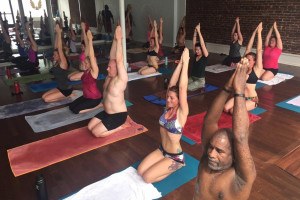Should You Work Out When You’re Sore?
It’s two days after your workout and you can barely move. It hurts to put your shirt on, it hurts to get up out of a chair, it even hurts to get out of bed. Unfortunately, muscle soreness is a part of life when you’re an avid gym-goer. The big question is: Should you hit the gym when you’re sore from yesterday’s workout, or take a rest day? The answer may depend on how sore you are and what exercise you want to do.
Why Am I So Sore?
Muscle soreness happens when you create small tears in the connective tissue around the muscle. Don’t worry, this is not the same as a muscle tear. Muscle soreness is a part of the healing process. When sore muscles rest, they rebuild and repair into stronger muscles. So make sure you don’t interrupt this process by doing heavy, intense exercise.
How Sore Is Too Sore?
If you’re extremely sore—i.e. so sore you can’t even shampoo your hair—you probably overdid it at the gym. This much soreness is common for people who are working out for the first time in a while. The bad news: this type of usually soreness gets worse on the second day. This level of soreness calls for three to four days of rest. On the third or fourth day (depending on when you feel better), you should stick to light cardio to help loosen you up.
If you’re just noticeably sore, but not so much that normal activities are killing you, take one to two days off and try doing a cardio workout or some stretching the next day.
If the soreness you’re experiencing feels like a bit of tightness, try doing a light to moderate cardio workout the next day followed by some stretching.
How Do I Reduce Muscle Soreness?
You have a couple of options:
• Light exercise: Doing a light workout in the form of yoga, very light resistance training, or light cardio has been shown to reduce the effects of delayed-onset muscle soreness.
• Massage: Although some studies conflict with others, many show that massage can alleviate muscle soreness. Just steer clear of deep-tissue massage, and keep the pressure on the lighter side.
• Anti-inflammatory medication: Medication, such as ibuprofen, may help reduce the pain and inflammation that comes with soreness. Just like any medication, there can be side effects, so make sure to consult your doctor before taking it.
• Stretching: Stretching can help loosen tight muscles by improving the range of motion. Stretches can be repeated after exercise, before bed, after waking, etc.
• Time: Time really does heal all wounds. Taking time to rest will gradually decrease your muscle soreness to a more manageable level.
How Do I Avoid Muscle Soreness?
While it’s almost impossible avoid all muscle soreness (hey, it’s the mark of a good workout, right?), you can minimize the effects of muscle soreness drastically. Some tips:
• Gradually increase the intensity: If you haven’t worked out in two months, working out really, really hard will get you back in shape in only one workout, right? Wrong. In fact, overdoing it when you haven’t worked out in a while will actually cause more harm than good. Not only will it take you almost a week to get back to normal, but you run the risk of injuring yourself by pushing a previously sedentary body too hard.
• Start slow: Find out what your body can handle by trying exercises you know you can do first. If you can do it with ease and don’t feel sore the next day, try increasing by a small amount the next workout. For example, say you can perform 10 reps on the leg press with 100 pounds of weight; if you don’t experience any soreness the day after, you could try 10 reps with 110 pounds the next time.
• Consistency is key: If you’re able to perform a workout without getting too sore, make sure you continue to be consistent and work out regularly. If you continue to workout regularly, your body will be able to maintain that level of strength until you are ready to increase your workload and intensity.
Remember, muscle soreness isn’t necessarily a bad thing. It means you’ve challenged your muscles to a level that they’re not quite used to yet. When you challenge your muscles, they will eventually get stronger. Just make sure not to overdo it by performing a workout that’s too challenging for you. Use the right intensity and resistance and you’ll experience steady gains for long periods of time.
>> See also: 4 Exercises You’re Doing Wrong at the Gym
…………..
Brian Maher is a personal trainer in Center City Philadelphia who specializes in weight loss and nutritional counseling. He is the owner of Philly Personal Training, a company offering convenient in-home personal training packages to busy individuals looking to improve their fitness levels. To learn more about Brian and his services, visit www.phillypersonaltraining.com.


